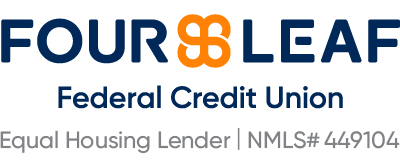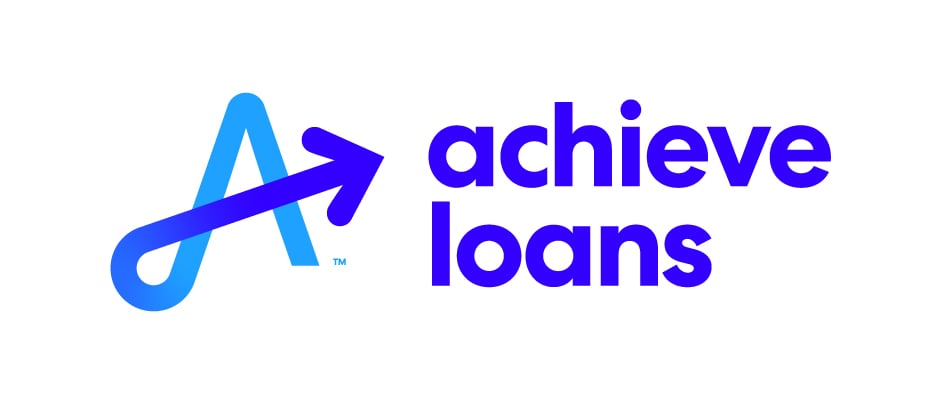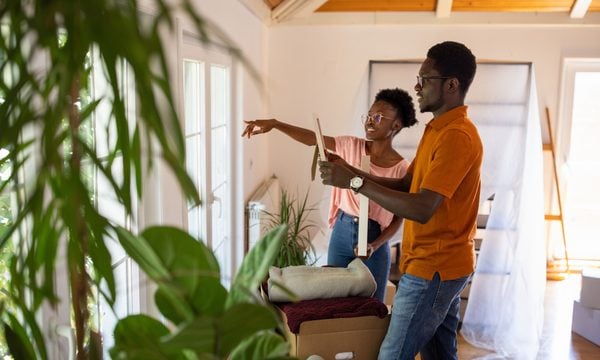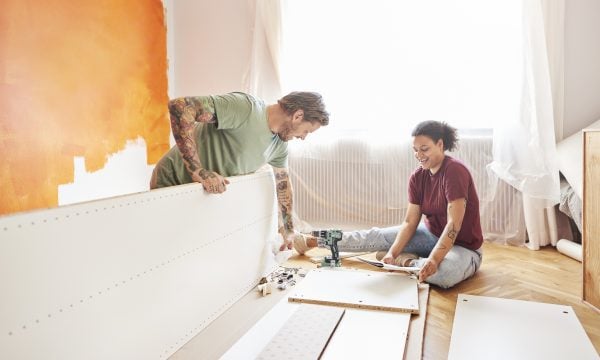HomeStyle Renovation Loans: Buy, Renovate With One Mortgage
Fannie Mae HomeStyle renovation mortgages let you buy and renovate a fixer-upper home with one loan.
Some or all of the mortgage lenders featured on our site are advertising partners of NerdWallet, but this does not influence our evaluations, lender star ratings or the order in which lenders are listed on the page. Our opinions are our own. Here is a list of our partners.
If you’ve been house hunting but haven’t found a place that's affordable and move-in ready, you may consider broadening your search to include fixer-uppers.
A HomeStyle renovation loan from Fannie Mae combines the home’s purchase price with the cost of improvements. This loan covers a wide range of projects, and the home isn’t required to be habitable at the time of purchase. However, all work must be completed within 15 months after the loan closes.
How does a HomeStyle renovation loan work?
Fannie Mae is a government enterprise that designs the guidelines for conventional mortgages, including HomeStyle loans. Fannie Mae doesn’t issue loans; instead, lenders like banks and credit unions finance home loans based on Fannie Mae’s guidelines, then Fannie Mae purchases them from the lenders. This helps the mortgage industry by freeing up capital for lenders to generate more loans. While you can choose among lenders that offer HomeStyle, these requirements and guidelines will be the same.
» MORE: Fannie Mae, explained
Eligible projects and properties
Fannie Mae designed HomeStyle to expand borrowers’ purchasing options to homes that require any number of repairs or renovations. Examples of projects that a borrower might finance with a HomeStyle loan include:
- Kitchen or bathroom remodel.
- New flooring.
- New roof.
- Landscaping.
- Building an addition.
- Adding an accessory dwelling unit.
Types of homes that are eligible for HomeStyle loans:
- One-to-four unit primary residences.
- One-unit second homes or investment properties.
- Manufactured homes.
- A unit in an eligible planned development, condo or co-op.
Advertisement



HELOC & Home Equity Loans from our partners

on FourLeaf Federal Credit Union
FourLeaf Federal Credit Union 

Min. credit score
670
Max. loan amount
$1,000,000

on Achieve
Achieve 

Min. credit score
600
Max. loan amount
$300,000

on Figure
Figure 

Min. credit score
600
Max. loan amount
$750,000
Ineligible projects and expenses
Some costs and projects cannot be funded with a HomeStyle renovation loan.
- Teardowns — removing everything but the foundation of a building.
- Building another residence on the property.
- Financing special assessments.
- Paying off existing projects or property debts.
Down payment requirements and borrowing limits
Borrowers must have a down payment of at least 3%. While you can finance the remaining 97% of the purchase and project costs, the portion of the loan that covers renovation expenses cannot be more than 75% of the projected value of the home after work is completed. For example, if the home will have an estimated value of $240,000 after renovations, you cannot borrow more than $180,000 (0.75 x 240,000) for those costs. DIY projects can constitute just 10% or less of the as-completed value.
Borrowers purchasing a manufactured house cannot finance more than $50,000 or 50% of the as-completed appraised value with a HomeStyle loan. DIY projects are not allowed for manufactured homes.
HomeStyle loans are subject to conforming loan limits. For a one-unit home in 2026, this is $832,750 in most areas and $1,249,125 in high-cost areas .
How to qualify for a HomeStyle renovation loan
In order to qualify for a HomeStyle loan, you’ll need the following:
- A credit score of at least 620, which is required for all Fannie Mae fixed-rate loans.
- A debt-to-income ratio under 45%, meaning that your monthly debts don’t add up to more than 45% of your pre-tax income. Borrowers with less debt will often have an easier time qualifying for a loan and may receive better rate offers.
Pros and cons of HomeStyle renovation loans
Pros
- Low down payment requirements. The minimum down payment for qualified borrowers is 3%.
- Project flexibility. You can finance most projects with a HomeStyle loan (up to 75% of the as-completed appraised value), and these projects are not required to increase the home’s value.
- No obligation to live in the home right away. If your home is not habitable, you can finance up to six months of principal, interest, tax and insurance payments while the property is being renovated.
Cons
- Renovation deadline. Work must be completed on the home within 15 months of getting the loan. If your projects are estimated to take longer, you may not be able to finance them with a HomeStyle loan.
- Financing limits. The portion of your loan reserved for your projects cannot exceed 75% of the as-completed value of the home.
- Limits on what you can do yourself. DIY renovations cannot exceed 10% of the home’s as-completed value.
Where to get a HomeStyle loan
HomeStyle loans are something of a niche product, and not every lender offers them. Four lenders that appear on our list of best mortgage lenders for first-time home buyers also offer HomeStyle loans:
It’s smart to shop around with at least three lenders to compare rate offers and select the deal that’s best for you.
Other ways to finance a purchase and renovation
HomeStyle is not your only option for financing the costs of buying and renovating a fixer-upper with one loan, and you may consider one of these alternatives.
FHA 203(k) loan
FHA 203(k) loans are insured by the Federal Housing Administration. Compared to HomeStyle loans, FHA 203(k) loans have more lenient credit requirements but are more strict about the renovation work that can be done.
For example, borrowers with credit scores of 500 or higher may qualify for FHA 203(k) loans. For HomeStyle loans, the minimum credit score is 620. The minimum down payment for a 203(k) loan is 3.25% if your credit score is 580 or higher; it's 10% if your credit score is 500 to 579.
203(k) loans can't be used to pay for work that the FHA deems luxuries. Examples include installing a swimming pool, adding an outdoor hot tub or sauna or building an outdoor barbecue pit or fireplace, although repairing an existing swimming pool is allowed.
Comparatively, HomeStyle loans have few restrictions on improvements, other than that most "should be permanently affixed to the real property (either dwelling or land)," according to Fannie Mae guidelines.
203(k) loans are exclusively for primary residences. The home may be a single-family house, a condo or other home in a one- to four-unit structure or a qualified manufactured home. Vacation homes and investment properties are not eligible. You may use a 203(k) standard mortgage to reconstruct a house on its original foundation.
» MORE: Best FHA 203(k) mortgage lenders
Freddie Mac CHOICERenovation
Like Fannie Mae, Freddie Mac is a government enterprise that designs and purchases mortgages from lenders. Freddie Mac has a program similar to HomeStyle called CHOICERenovation. An “express” option called CHOICEReno eXPress finances smaller-scale projects.
Like HomeStyle loans, CHOICERenovation loans require a credit score of 620 or higher and can be used to finance most projects that cost 75% or less of the home’s as-completed appraised value. Two main features differentiate CHOICERenovation from HomeStyle:
- CHOICERenovation loans can be used for renovations to prevent or repair damage from a disaster.
- Among lenders surveyed by NerdWallet, CHOICERenovation loans were less commonly available than HomeStyle loans.
Article sources
NerdWallet writers are subject matter authorities who use primary,
trustworthy sources to inform their work, including peer-reviewed
studies, government websites, academic research and interviews with
industry experts. All content is fact-checked for accuracy, timeliness
and relevance. You can learn more about NerdWallet's high
standards for journalism by reading our
editorial guidelines.
- 1. FHFA.gov. FHFA Announces Conforming Loan Limit Values for 2026. Accessed Dec 1, 2025.
Methodology
How we chose the best personal loans
Our team of consumer lending experts follows an objective and robust methodology to rate lenders and pick the best.

30+
Lenders reviewed
We review over 35 lenders, including major banks, top credit unions, leading digital platforms, and high interest installment lenders operating across multiple states.

25+
Categories assessed
Each lender is evaluated across five weighted categories and 27 subcategories, covering affordability, eligibility, consumer experience, flexibility, and application process.

60+
Data points analyzed
Our team tracks and reassesses hundreds of data points annually, including APR ranges, fees, credit requirements, and borrower tools, ensuring up to date, accurate comparisons.
Star rating categories
We evaluate more categories than competitors and carefully weigh how each factor impacts your experience.
NerdWallet’s review process evaluates and rates personal loan products from more than 30 financial technology companies and financial institutions. We collect over 60 data points and cross-check company websites, earnings reports and other public documents to confirm product details. We may also go through a lender’s pre-qualification flow and follow up with company representatives. NerdWallet writers and editors conduct a full fact check and update annually, but also make updates throughout the year as necessary.
Our star ratings award points to lenders that offer consumer-friendly features, including: soft credit checks to pre-qualify, competitive interest rates and no fees, transparency of rates and terms, flexible payment options, fast funding times, accessible customer service, reporting of payments to credit bureaus and financial education. Our ratings award fewer points to lenders with practices that may make a loan difficult to repay on time, such as charging high annual percentage rates (above 36%), underwriting that does not adequately assess consumers’ ability to repay and lack of credit-building help. We also consider regulatory actions filed by agencies like the Consumer Financial Protection Bureau. We weigh these factors based on our assessment of which are the most important to consumers and how meaningfully they impact consumers’ experiences.
NerdWallet does not receive compensation for our star ratings. Read more about our ratings methodologies for personal loans and our editorial guidelines.
More like this
Related articles








